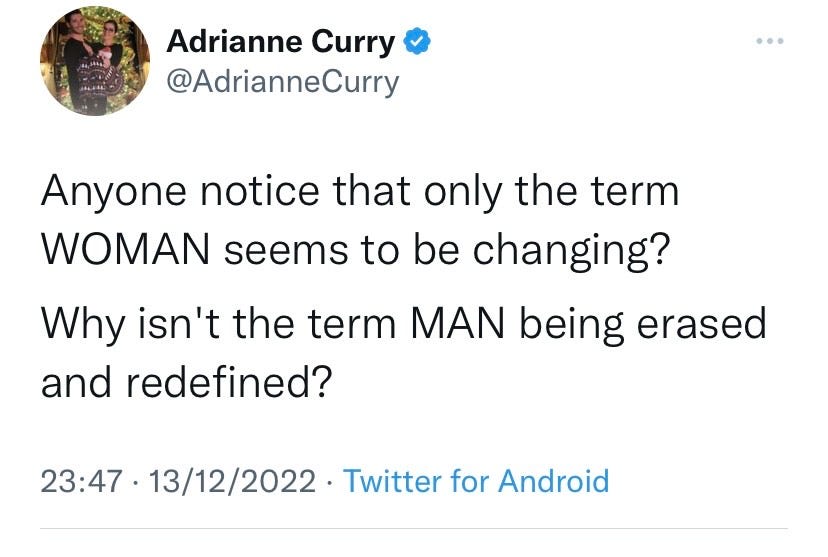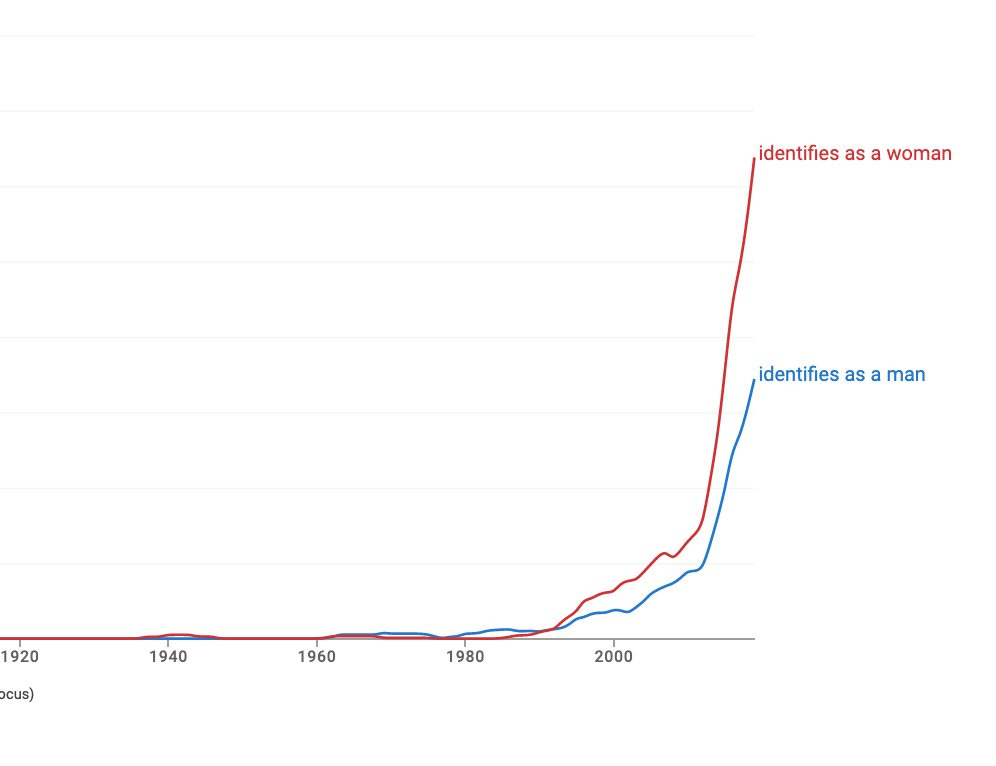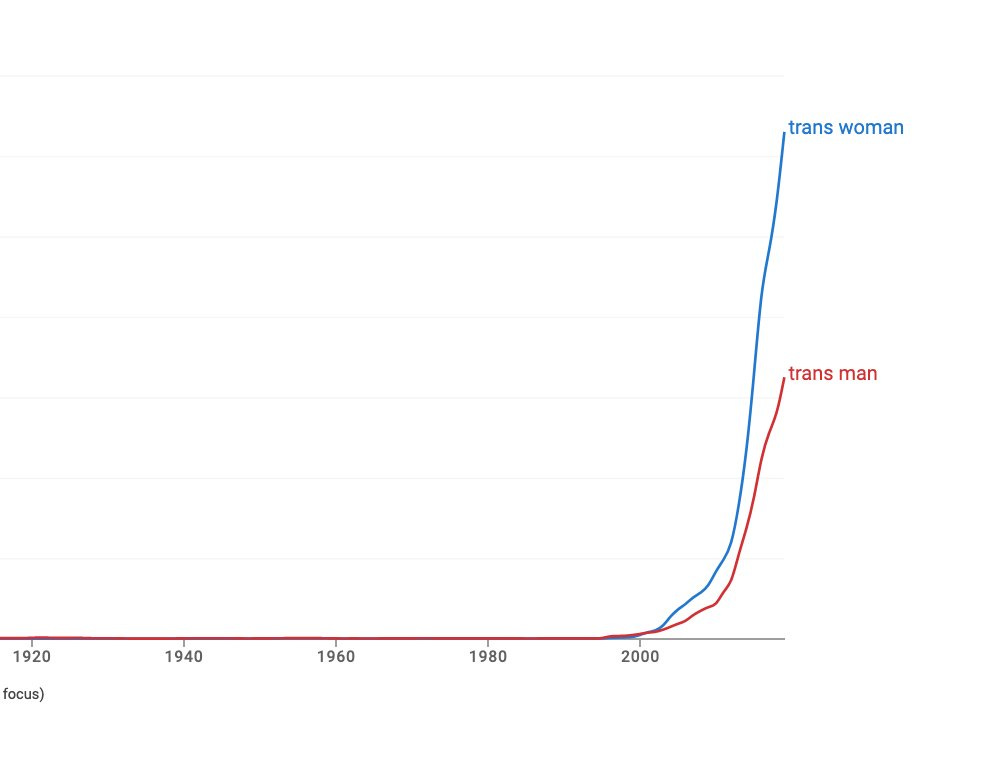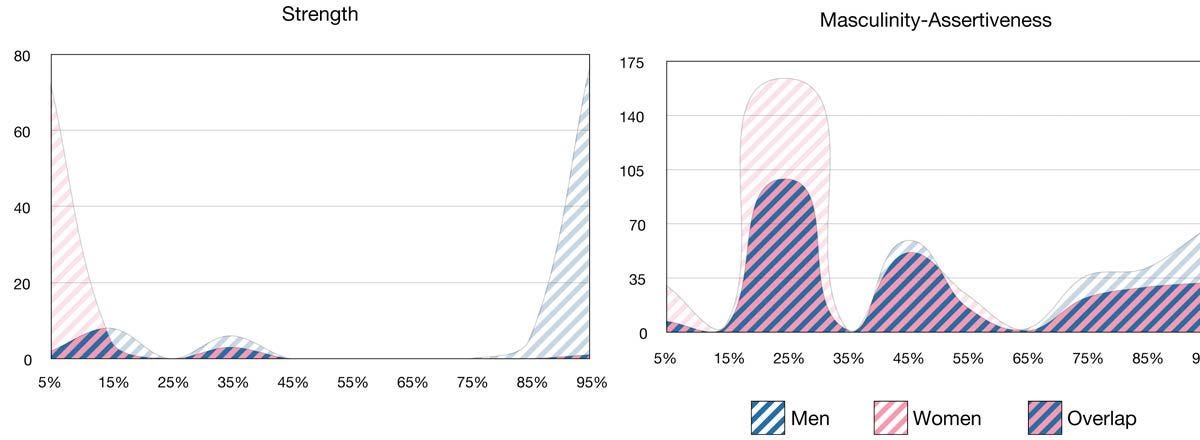Why Does the Trans Debate Focus so Much on Women?
No, it's not the patriarchy.
It is frequently noted that the debate about trans issues - which range from reasonable discussions about conflicts of interests to just hurling accusations of transphobia or misogyny at the opposition - is very much centred on the definition of “woman.” Many people have pointed out that the definition of the word “woman” is so much more contested and defined in so many different ways than the word “man” in visible discussions of the topic.
It is possible that this is a misconception and that perceptions are skewed by what is most visible on social media than what people are really focusing on. However, it would have to be very skewed as there seems to be ample evidence that the transgender debate really is more focused on trans women, that there are more arguments for and against their acceptance as women in every situation and more arguments about the definition of ‘woman’ than there is focus on trans men and the definition of the word ‘man.’ A look at search terms by the anthropologist, Neil Thin, adds strength to this observation.
It has been argued, by gender critical feminists, that the reason that women are the ones having to argue so much for the acceptance of ‘woman’ as a biological category is because it is only women who are expected to subordinate their own interests to those of others.
That is, it is argued that sexism and a disregard for the rights of women who are seen as secondary citizens who exist to accommodate the needs of men before their own is inherent to trans activism. Trans activism, it is argued, is all about serving the wants of biological men and the patriarchy.
Regarding trans rights as penis rights clearly does not include any trans person who does not have a penis which would cover most trans men. This is where things get very complicated because this necessarily requires feminists to, at least while making that statement, pay attention only to the trans people they regard as men while ignoring the views of those trans people they regard as women. Ignoring women is also required if one wants to blame the existence of trans activism on men.
In reality, however, trans activism and the acceptance of the gender identity of trans people does not appear to be driven by men.
The fact that gender identity is more accepted by women than by men, at least in the UK, is inconvenient for those feminists who wish to neatly slot the rise of trans activism into their worldview of a society dominated by the patriarchal oppression of women by men.
If feminists wish to argue against gender identity as an oppressive social construct or simply to argue that trans people cannot fairly and safely be accepted as the gender by which they identify in every situation, they would do best to correctly identify their opponents. They will need to stop claiming that the problem is men and accept the fact that more of the people who accept trans identity are women. This will include ceasing to start sentences arguing for the protection of women’s spaces and sports by telling people, often women, what women do and don’t want. Women clearly differ widely on this and so they would do best to argue against the set of ideas they oppose, rather than asserting that “Women don’t want men in their spaces” or that “Transactivism is entitled men refusing to accept that women have said “No.” Any gender critical feminist wishing to ensure that the definition of woman remains “adult human female” would be wise not to, in practice, redefine “women” as “gender critical feminists” by telling any woman arguing with them what women want as though, by disagreeing with them, she has ceased to be one. They would also do well not to alienate men as a whole when they are statistically more likely than women to agree with them.
Why, then, given that the rise of trans activism does not seem to be driven by men or the patriarchy, does it seem as though biological men and trans men are much less in the crosshairs of it while biological women and trans women are much more front and centre? It is not hard to see why gender critical feminists see an imbalance here when they feel themselves to be having to do all the work of protecting everything from definitions to spaces to sports while biological men, even if gender critical, appear to be relatively unbothered by any such necessity on behalf of their own sex. It is also trans women who are more often the targets of abuse on social media with ‘transwomen’ often trending on accompanied by negative messaging while trans men are largely ignored or considered tangential to the debate. The main exception to this is when it comes to surgical or hormonal treatment for biologically female adolescents identifying as transmasculine and then this is again addressed as an issue negatively affecting girls and women and sometimes blamed on the patriarchy. It is very hard to escape the conclusion that trans issues are centred very much on women and concepts of “womanhood” and much less on men and concepts of “manhood” (except when men are erroneously blamed for them).
The reasons for this should be obvious, but it seems that, to many, it isn’t, as the question arises again and again. Men are significantly bigger, stronger and faster than women. While there may be some significant overlap in body size and in personality traits associated with dominance behaviours, there is very little in physical strength.
The reason that trans men seem to largely disappear from the issue and biological men have formed no large movement to protect the definition of “man” or their spaces or their sports is because they don’t need to. While a biological man may feel uncomfortable or even violated if someone he perceives as female observes his penis as he is using a urinal, he is unlikely to feel afraid. If men do feel uncomfortable, they do not appear to feel it strongly enough to have formed any movement to keep trans men out of their spaces. Therefore, trans men activists are not fighting for access to them and they are barely visible in bathroom debates. Similarly, biological men do not feel any need to object to trans men competing against them in elite sporting events because there aren’t any due to that strength and speed difference. Therefore, trans men activists are not fighting for access to men’s sports and they are barely visible in sports debates.
Because biological men have very seldom felt any need to object to the inclusion of trans men in any place in an organised way (with the possible exception of gay men objecting to being accused of being transphobic for not being attracted to trans men), trans men activists have not felt nearly as much need to assert their manhood & pressure for changes to definitions that reflect that. While some men have objected to being referred to as “prostate-havers,” they do not appear to have felt demeaned enough by this to organise a movement to oppose it in the same way gender critical feminists and other women, who don’t consider themselves to be gender critical feminists, have objected to being referred to as “menstruators”.
This does not mean that biological men do not engage on this issue or take it seriously. It mostly means that they do not primarily engage on it on their own behalves. There are those who are trans activists and engage on behalf of those trans people who are also trans activists. They just do this in smaller numbers than biological women do. There are others who are gender critical and concerned about the impact of authoritarian trans activism, but then they are more likely to engage in defence of women’s spaces and sports than their own for the reasons given above. They also do this is smaller numbers than women do. There really are safety and fairness issues that affects biological women but not biological men when it comes to accepting trans people’s gender identity in every space and situation. Recognising this is not very patriarchal of men, at all.
Whether you are a gender critical feminist who believes the very concepts of gender and gender identity are harmful to society and the pursuit of equality for women or, like me, you are not and believe that society can and should be accepting of trans people barring a very few situations where safety and fairness require trans women to have their own spaces or sporting categories, recognising all this is key. The debates around trans issues centres on women’s rights, not because they are being neglected by men whose spaces and sports are just automatically protected, but because they are being recognised and prioritised by people of both sexes, but more women. Trans women are more visible than trans men in the debates because they are subject to greater hostility and suspicion and so are regarded as in need of more support by people of both sexes, but more women. One of the reasons that trans issues are so intertwined with women’s issues is because there are more women on both sides of it. Recognising this is vital to addressing the issue as it is and also to identifying the key actors correctly by their stance on the issue and not by their sex or their gender identity.











Another great piece Helen - thank you.
I would class myself as "gender critical". There are 2 main reasons for this. I do think there's a conflicting set of 'rights' here (or privileges, or feelings, or however we might want to frame this) and that the legitimate concerns of a particular group (women) are being steamrollered and ignored by the also legitimate concerns of a much, much smaller group.
If we take the 'traditional' understanding of trans as someone with a severe 'gender' dysphoria then we have a person who, for whatever reason, is severely distressed by the body they have and want to be the opposite sex. I think for the majority here, "trans" is not an identity, it's a necessary method by which they can find some measure of peace and relief from their suffering. In fact, I suspect that, ideally, they don't want to be recognised as 'trans', but as their chosen sex.
It must be heart-breaking for these individuals who have undergone this tortuous and difficult medical process to be denied access to a space reserved for members of their chosen sex.
But, on the other hand, it's very clear that if we go down the route of self-ID, this will be abused by predatory individuals. I really don't know how to square the circle here.
I think you've hit the nail on the head when it comes to the lack of concern about transmen in men's spaces. Some single-sex spaces are important - it's great sometimes to just hang out with the guys, and it must be similarly great to just hang out with the girls. But I think women have another requirement over and above this social one - and that's entirely due to their vulnerability - a vulnerability that men (by and large) do not share.
As a not very physically imposing guy there would be certain places in a city where I would be afraid to walk at night, for example. But I can't say I've ever really been worried about the possibility of *sexual* assault. I think many women (most?) do have to worry about this extra dimension - and it must be an absolutely terrifying extra dimension.
This vulnerability and extra source of fear is the reason why we have single-sex spaces for women - particularly when it comes to things like rape crisis centres, or domestic violence shelters - and also why single-sex facilities like bathrooms and changing rooms are important.
But how we address these legitimate requirements whilst still being compassionate and decent to those who have undergone transition? I don't know. If we extend the notion of 'trans' to any who fall under the trans umbrella, then we have a serious problem that I don't think can be solved.
And this is the second reason why I'm "gender critical" - I can't make any coherent sense of it all. I don't understand 'gender', I don't understand 'gender identity' - they seem to be vague, subjective, terms that rely principally on stereotypes and stereotypical notions.
I don't know what it "feels like" to be a woman, I can only have an *idea* of what I *think* it feels like. But I also don't know what it "feels like" to be a man - I only know what it feels like to be me.
The other issue is that if we restrict our thinking to just the problem of man vs woman and the various societal stereotypes, it's bad enough trying to get your head round things. But we also have new 'genders' seemingly being discovered everyday. What are we to make of an individual who says that they used to be genderfluid but are now more gaseous or plasma gendered? It's absolutely farcical - and how do we separate what might be seen as 'legitimate' gender confusion when it comes to man vs woman and the crazy new stuff?
As far as I can tell at the moment, the only thing the concepts of 'gender' and 'gender identity' have brought is a massive amount of wholly unnecessary confusion.
It seems to me that when you say you are not gender critical because you don’t agree with some gender critical women, itis a bit like the many women I know who say they are not feminists because they disagree with certain feminists. And yet, these « non feminists » believe women should have equal rights and opportunities. What I mean is, we are quibbling about a label more than about beliefs. If a person believes women sometimes have the right to single sex spaces, I think they are by definition gender critical. I consider myself gender critical because I believe sex is real. The reality of sex means that there are some situations where women require single sex spaces. And that’s all I need to believe to be gender critical. Some people who share that belief will have different ideas than I do about what motivates activists, etc. I often disagree with much of what certain gender critical writers believe, But we are fundamentally gender critical if we acknowledge the reality of sex. While I agree with all of your analysis, I don’t understand why you say that you are not gender critical and that you think women should be entitled to sigle sex spaces. I see those two things as incompatible- what am I missing? Or perhaps a better question is what should we call ourselves if we believe sex is a material reality that cannot always be ignored?